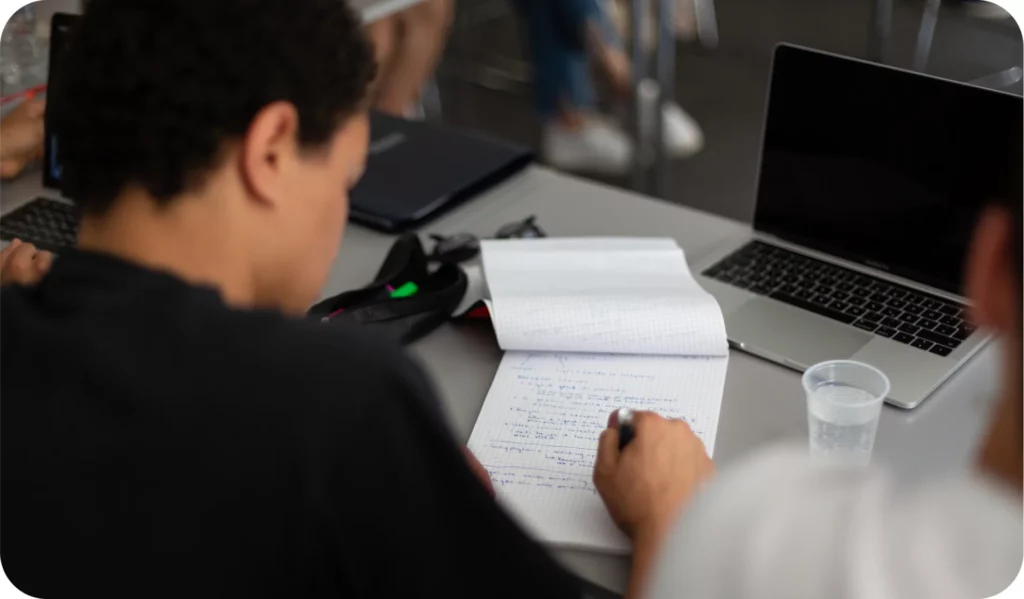A letter of recommendation can play a crucial role in opening doors to academic, professional, and personal opportunities. Whether you’re applying for a job, a place at university, a scholarship, or an internship, this type of letter provides a trusted third-party perspective on your skills, work ethic, and character. It might be a necessary part of the application process, or it could be a bonus to attach to your application to help you stand out. Understanding how to ask for a letter of recommendation properly is essential in navigating today’s competitive landscape.
What Is a Letter of Recommendation?
At its core, a letter of recommendation is a written endorsement provided by someone who knows you well in a professional, academic, or volunteer capacity – AKA someone you’ve worked with, been taught by, or volunteer for. Its purpose is to vouch for your abilities, integrity, and potential. Often, this letter is submitted as part of an application process, whether for a job, a university course, or even a leadership programme.
Recommendation letters differ from references in format and purpose. A reference is usually provided over the phone or via email, often informally. A letter of recommendation, on the other hand, is a formal, carefully written document addressed to the decision-makers in your application process.
These letters carry weight because they provide a credible assessment of your character and qualifications from someone who has directly observed your growth or contribution. They offer insight beyond what a CV or personal statement can convey – making them a powerful tool in any application.
Key Parts of a Standard Letter of Recommendation
A high-quality letter of recommendation generally includes several key components. These standard elements ensure the letter is useful, clear, and impactful for those reading it.
1. Salutation and Introduction: The letter should start with a formal greeting, ideally addressed to a specific person or panel. The introduction typically states who the recommender is, their role, and how they know you. This section sets the stage for why their opinion is valid.
2. Description of the Relationship: A strong letter doesn’t just list your accomplishments. It offers a personal insight into your growth and behaviour in context. This section outlines how long the recommender has known you, in what capacity (e.g. supervisor, tutor, project lead), and provides relevant context.
3. Specific Examples and Achievements: General praise is less impactful than specific anecdotes. A great letter highlights your standout moments – projects you led, problems you solved, challenges you overcame, or consistent patterns of excellence. It may also describe your attitude, communication skills, and how well you collaborate with others.
Students who complete an Immerse summer school and show exceptional engagement receive a letter of recommendation from their tutor detailing their accomplishments throughout the programme. This letter details the student’s attitude towards learning, the projects they completed, and their academic strengths. This means that an Immerse graduate could find themselves applying to Oxford or Cambridge with a letter from a tutor that has taught at that university!
4. Skills and Qualities: This is where the recommender connects your abilities to the requirements of the opportunity you’re applying for. These might include technical or subject-specific knowledge, but also soft skills like time management, resilience, or leadership.
5. Final Endorsement and Contact Details: The closing paragraph should clearly state the recommender’s support for your application. Phrases like “I strongly recommend…” carry weight. Contact information should be included in case the recipient wants to follow up.
6. Signature: A formal signature, especially on institutional letterhead, adds credibility.
When all these parts come together, the result is a letter that is both personal and persuasive – one that reassures the reader of your capabilities.
Why Recommendation Letters Matter
You might wonder: with personal statements, CVs, and interviews, why do you even need a letter of recommendation?
Because it provides evidence. It substantiates your claims from a third-party perspective – someone with nothing to gain from exaggerating your achievements. It humanises your application, offering insight into how you operate in a real-world setting.
For academic applications, especially to competitive universities, recommendation letters can tip the scales between equally qualified candidates. Admissions tutors look for more than grades – they want to know about your curiosity, collaboration, independence, and potential to thrive in their environment.
In employment settings, especially for graduate roles or internships, employers value insight into how you’ve performed in previous roles. A well-written employment recommendation letter helps them feel confident in their choice.
They’re especially useful in circumstances where your academic transcript or CV may not tell the full story. Perhaps you had a difficult personal year and your grades dipped – a tutor’s letter explaining your resilience and progress might help. Or maybe your CV doesn’t reflect how well you lead team projects – a recommendation can highlight this.
Ultimately, recommendation letters matter because they make your application feel more complete, more personal, and more trustworthy.
Join the Immerse Education 2025 Essay Competition
Follow the instructions to write and submit your best essay for a chance to be awarded a 100% scholarship.

How to Ask for a Letter of Recommendation
Now that we’ve established the importance of a letter of recommendation, the next step is understanding how to ask for one effectively. Many people feel awkward requesting this kind of favour – but it doesn’t need to be uncomfortable if you approach it the right way.
If you’ve completed an Immerse programme and demonstrated exceptional effort, engagement, and academic promise, your tutor will consent to their evaluation being shared with you as a letter of recommendation – meaning you can skip the process of requesting a letter of recommendation. If you haven’t taken part yet, follow the steps below!
Make a List of 5–10 Contacts
Start by brainstorming who you might ask. Think beyond just job titles. You’re looking for people who genuinely know you well and can speak to your strengths with authenticity.
Possible contacts include teachers, tutors, pastoral staff, volunteer coordinators, managers, or even colleagues you’ve worked closely with. Aim for diversity – having a range of people from different settings (academic, work, extracurricular) means you can match the letter to the opportunity.
It’s helpful to choose people with some authority or relevance to your application. A casual friend who thinks highly of you won’t carry the same weight as a teacher or mentor in your subject area.
Align your goal with someone who can speak directly to that aspiration. Say you’re applying for a Computer Science programme and have spent months building an app outside of class – a computing teacher who’s seen your coding ability or mentored your project would be ideal. They can vouch for your technical skills, persistence, and initiative in a way a generic school reference can’t.
If you’re applying for a leadership scholarship, someone who’s witnessed you lead – a coach, club advisor, or prefect coordinator – can give your application authenticity. Hoping to study English Literature? That English teacher who saw you improve over time and push yourself with independent reading is far more compelling than someone who taught you only briefly.
The best recommender is someone who understands your goal and can provide concrete examples of how you’ve already taken steps toward it. That connection strengthens your case.
Once you’ve identified your shortlist, rank them based on how likely they are to say yes – and how relevant their recommendation would be for the application in question.
Reach Out to Each Contact by Phone (If Appropriate)
Whenever possible, ask in person or over the phone. It’s more personal and respectful, especially if the person is someone you see regularly or hold in high regard. You’ll also get an immediate sense of whether they feel confident writing a positive letter for you – which is vital. You don’t want a half-hearted or generic letter.
You can say something like:
“Hi [Name], I’m applying for [programme/job] and a recommendation letter would really strengthen my application. I was wondering if you’d feel comfortable writing one for me – I really value your insight, especially because of our work on [project/class/role]. I’d be happy to share all the relevant information.”
Make it easy for them to say no. You want someone who’s enthusiastic about recommending you, not someone who feels obliged.
Write a Formal Request for a Recommendation
Once they’ve said yes, follow up with a written request – usually via email. This allows you to provide all the important details they’ll need to write the letter:
- What you’re applying for and the deadline
- Why you’ve chosen them specifically
- A brief summary of your time together (remind them of projects, contributions, or milestones)
- Any key points you’d love for them to include
- Practical submission details (email address, link, etc.)
This isn’t just about convenience. It helps your recommender do a better job. They might not remember every detail about your work, so giving them prompts ensures the letter is accurate and tailored.
Include your CV and your personal statement if relevant – this will help them align their letter with your overall application tone. We’ve included examples below, but use your judgement to tailor your request to the individual.
Example 1 (for university application):
Subject: Request for Letter of Recommendation – Oxford Computer Science Application
Dear Dr Patel,
I hope you’re well! I’m applying to Oxford to study Computer Science, with a deadline of 15th October. I’d be honoured if you’d consider writing a recommendation letter for me. Your insight into my programming work and class engagement would mean a lot.
We worked closely on the independent app project last term, and you saw how I approached debugging and built that scheduling tool from scratch. If possible, I’d love for you to mention my problem-solving approach and ability to work independently.
The submission link is here: [link], and it’s due by 15th October. I’ve attached my CV and personal statement for context.
Thanks again – I really appreciate your time and support.
Best,
Amir
Example 2 (for internship application):
Subject: Request for Reference – Marketing Internship at RedScope
Dear Ms Lennox,
I’m applying for a summer internship at RedScope Marketing and was wondering if you’d be willing to write a recommendation. It’s due by 5th May via this link: [link].
You supervised me during my term as school magazine editor, and I think you could speak to my organisation, creativity, and collaboration – especially when we produced the themed double issue. If you’re happy to help, I’ve attached my CV and cover letter to guide you.
Thanks again – let me know if you need anything further.
Warm regards,
Layla
Thank Everyone Who Provides a Recommendation
Always follow up with a thank you – ideally a written message, or even a small gift if appropriate. Let them know the outcome of your application too. People appreciate knowing their effort had an impact.
Expressing gratitude doesn’t just show manners – it also preserves your professional relationships for the future.
Advice for Writing Letters of Recommendation (If You’re Ever Asked)
At some point, you might be the one asked to write a letter of recommendation – perhaps by a student, intern, or junior colleague. Writing a strong letter isn’t just a matter of praise. It’s about offering specific, sincere, and relevant insight.
Here are a few tips:
- Ask what the letter is for – what’s the role, and what are they aiming to showcase?
- Make notes of your experience with the individual. What stood out? What impressed you? What grew over time?
- Be honest but generous. If you can’t write a positive letter, gently decline.
- Include anecdotes. Don’t just list adjectives like “hardworking” or “talented” – show them through stories.
- Keep it concise. A page is standard. Too short feels rushed, too long loses impact.
- Use professional formatting and tone – especially for academic or job applications.
If you’re unsure, look up examples from reputable sources (like Harvard or Indeed) and adapt them to your voice. We’ve also created a template here.
Being a recommender is a privilege and a responsibility – treat it as a chance to support someone’s growth and success.
Final Thoughts
Letters of recommendation are more than formalities – they’re personal endorsements that can significantly strengthen an application. Whether you’re the one asking or the one writing, the key lies in authenticity, specificity, and respect for the process.
If you’re applying for something competitive, a compelling letter can add real weight to your application. And if you’re requesting one, remember: it’s a normal, even expected, part of academic and professional life. Asking is not an imposition – especially if you’ve built the relationship and prepared your request with care.
Approach the process with confidence, clarity, and gratitude – and you’ll be far more likely to receive a glowing letter that opens the doors you’re hoping for.































